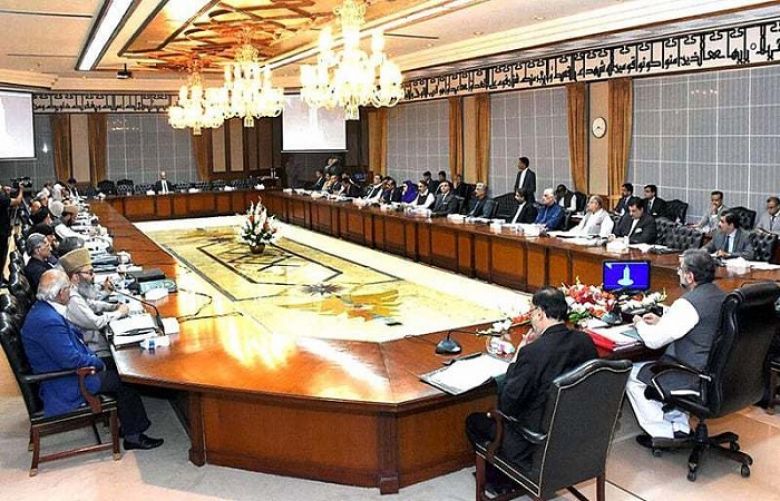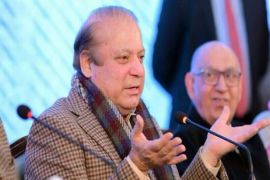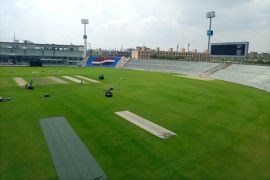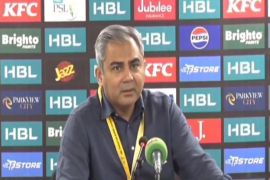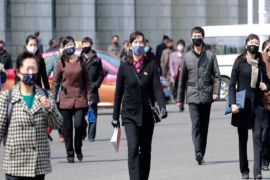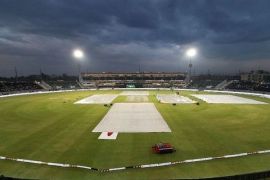After facing opposition from some of his colleagues in the federal cabinet to his proposal of imposing a ban on automatic weapons in the country, Prime Minister Shahid Khaqan Abbasi on Tuesday constituted a committee to further deliberate the matter in order to come up with a consensus decision.
Sources told that almost all the cabinet members belonging to Balochistan and Khyber Pakhtunkhwa opposed the proposal of banning the issuance of arms licences for prohibited and automatic weapons, citing security reasons.
Taking part in the discussion on the first agenda item — “arms licensing regime and ban on automatic weapons” — the ministers and advisers belonging to the two provinces said the people had been forced to keep automatic weapons with them due to the serious security situation in the wake of terrorism.
“We have survived terrorist attacks,” one of the ministers was quoted to have stated during the discussion after a comprehensive briefing by the interior secretary on the laws dealing with the issuance of arms licences.
However, the sources said, the majority of those who spoke on the issue were in favour of a ban on the issuance of licences for automatic weapons, saying that such a step could help improve the overall law and order situation in the country.
After hearing the arguments from both sides, the prime minister constituted a committee, to be headed by him, to collate the proposals of the cabinet members and bring the issue again to the cabinet.
The committee comprises Interior Minister Ahsan Iqbal, Minister for Capital Administration and Development Dr Tariq Fazal Chaudhry, Minister of State for Information Marriyum Aurangzeb and National Security Adviser Nasir Janjua.
The prime minister, however, directed the Ministry of Interior to “revalidate data regarding licences issued”. The ministry was asked to give “a 90-day grace period” to all licence-holders of prohibited weapons for registration with the National Database and Registration Authority (Nadra).
In his first speech in the National Assembly following his election as new prime minister on Aug 1, Mr Abbasi had put forward his own vision to improve the socio-economic conditions and security situation in the country, showing that he had some personal ambitions apart from following the Pakistan Muslim League-Nawaz’s guidelines.
PM orders revalidation of arms licence data; cabinet to meet every Tuesday
The prime minister had vowed to broaden the tax net to include every affluent individual and expressed his desire to put a ban on issuance of all automatic weapon licences in the country. He had declared that those who did not pay taxes and were living a luxurious life would have to pay taxes.
The other major step Mr Abbasi had announced was the cancellation of all automatic weapons licences, saying the government would seize all automatic weapons and compensate the people in return. He had said that he would only take these measures if allowed by the cabinet and parliament, clearly indicating that this was his personal agenda.
The other item on the agenda of the cabinet meeting was a briefing by officials of the revenue division on the “broadening of tax base 2013-17 and onward”. However, the sources said, the prime minister did not allow the officials to give a presentation, saying that the data placed before the cabinet was not “sufficient”. Moreover, he said, since Finance Minister Ishaq Dar was not present, the cabinet would take up the matter at its next meeting.
At the outset of the cabinet meeting, the prime minister told his colleagues that they would meet every Tuesday evening.
He informed them about his last week’s visit to Karachi, where he had announced Rs25 billion for Karachi and Rs5bn for Hyderabad under a comprehensive package which would be implemented by the federal government under the policy and administrative supervision of the Sindh governor with fixed timelines and costs.
Giving details about the package, Mr Abbasi said one hospital and a medical college would be set up in Karachi and Green Line Metro would be extended to other parts of the city. He said additional resources for new water projects would also be made available, besides providing 50 fire tenders to the Karachi Municipal Corporation. The package also includes construction of a number of underpasses and bridges to reduce the traffic mess.
Similarly, the prime minister said, Hyderabad would get one university and a medical college. The package also includes a special grant for the Hyderabad Municipal Corporation and upgrade of infrastructure of all industrial states. These projects, he said, would be executed within fixed time and cost and transparently.
According to an official handout, the prime minister said record funds had been disbursed among the federating units under the PML-N government. He also informed the cabinet about a meeting on law and order which he had chaired during his visit to Karachi in the wake of a recent surge in street crime in the city.
Mr Abbasi said the Sindh government had been asked to play its due role in development work in the province in general and Karachi in particular. He reaffirmed the federal government’s all-out support for the provincial government in development and ensuring peace and security in Sindh.
Despite sitting on the opposition benches, the Muttahida Qaumi Movement (MQM) had supported Mr Abbasi during the PM’s election in return for his assurances that his government would pay attention to the party’s demands. During his visit to Karachi, the prime minister had held a meeting with a delegation of the MQM.
The prime minister also informed the cabinet about the recent presentations given to him on the matters related to the Water and Power Development Authority and the National Highway Authority that lasted several hours but remained incomplete due to paucity of time.
Mr Abbasi said that so much development work and energy initiatives had been taken under the PML-N government that were difficult to summarise in detailed presentations. He said that all the development and energy security initiatives had either been completed or in completion phase “which speaks volumes of the development and energy security endeavours bearing fruit during the PML-N government since 2013, and which are unmatched if we compare the current initiatives with those planned from 1999 to 2008”.
Meanwhile, the cabinet approved “initiation of negotiations on inter-government agreement between Ministry of Petroleum and Natural Resources and National Development and Reforms Commission of the People’s Republic of China for supply of POL products and liquefied natural gas (LNG)”.
It also ratified an agreement between the Pakistan government and “the government of Hong Kong Special Administrative Region of the People’s Republic of China” regarding avoidance of double taxation and “the prevention of fiscal evasion with respect of taxes on income”.
A nine-point agenda issued for the cabinet meeting also included approval to a 10 per cent raise in salaries of parliamentarians as committed by Finance Minister Dar at the time of the passage of the federal budget in June this year. However, the issue was deferred.

